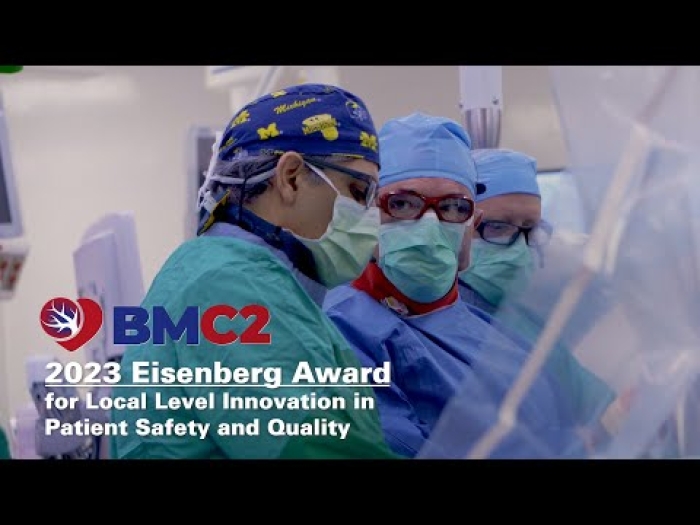
Alzheimer's disease is a scary diagnosis. For some, it may even feel like a death sentence. But for Henry L. Paulson, M.D., Ph.D., the Lucile Groff Professor of Neurology and director of the Michigan Alzheimer's Disease Center, there are many reasons to be optimistic about the future of treating Alzheimer's disease. Here, he dispels some myths and talks with us about diagnostic blood tests and why you need to get a good night's sleep.
What is the difference between Alzheimer's disease and other dementias?
Dementia is an umbrella term. It encompasses a large number of dementias, including Alzheimer's, which represents the most common dementia within that umbrella group. The other common dementias include Lewy body dementia, vascular dementia, and frontotemporal dementia.
More than 50% of dementia is Alzheimer's disease. It's important also to know that a lot of dementia is what we call mixed pathology. That is, more than one thing is going on.
What is the distinction between age-related dementia and these specific diagnoses?
As we age, our brain does change. Our brain does shrink a little as we get older, but we don't necessarily become less wise. The speed at which we process information will slow down as we get older.
But to lose large chunks of memory is not normal. It's a sign of pathology. We talk about episodic memory loss. That is, you may lose an entire episode that occurred — a vacation you had, a dinner party, a visit from a friend. You don't recall at all that it happened, and it happened three weeks ago. That is concerning.
It's not concerning that you can't remember the name of that actor in that movie, or that you may have forgotten the name of a neighbor who lives four blocks away when you only see them twice a year.
The reality is, all dementias are age-related. They occur as we age. Dementia does not occur in children. It is a disease of adults, particularly older adults. Some dementias occur a little earlier than others. Frontotemporal dementia, for example, often occurs in the 50s, whereas Alzheimer's often occurs in the 70s.
How is Alzheimer's disease diagnosed?
We diagnose Alzheimer's through a careful history, a neurologic and neuropsychological exam, various blood tests to rule out reversible, treatable causes of cognitive impairment, as well as imaging of the brain. Soon I think we will have effective blood tests that are very specific for Alzheimer's and, hopefully, other forms of dementia.
Are there any behaviors proven to stave off Alzheimer's disease?
Yes. There are things that we know absolutely reduce one's risk of developing [any type of] dementia. One is something you can't do much about, which is how much education you had. But continuing to engage in stimulating work and activities is one way to keep your brain nimble, to have what's called a "high cognitive reserve."
Another thing that clearly makes a difference is careful control of blood pressure, if you have hypertension. Studies have shown that rigorous control of blood pressure reduces risk of dementia.
In the clinic, we talk about how critical it is to treat, effectively and rigorously, diabetes, hypertension, and hypercholesterolemia, because treatments for those conditions do reduce one's risk of developing dementia.
We also think it's vitally important that you get enough sleep and that your sleep be restful. Data show that good sleep, restful sleep, is somewhat neuroprotective.
Exercise we now know seems to improve cognitive performance in people who are aging. Having aerobic exercise three times a week, I think, is critically important.
What do we need to know about past studies of Alzheimer's disease?
Behavioral neurologists are now very much aware that dementia is tremendously heterogeneous. It varies a lot from person to person. We're increasingly working to make precise diagnoses. Some of the trials that have failed, have failed in part because people who enrolled didn't necessarily have Alzheimer's. They had some form of cognitive impairment but didn't have the neuropathological changes that are definitive of Alzheimer's.
What myths do you want to dispel about Alzheimer's disease?
There are two myths. When I give the diagnosis of Alzheimer's, sometimes people feel like this means the end of their life. Actually, it means the beginning of the next phase of their life. People still have tremendous talents and skills, and we need to look at what they can do versus what they can't do.
The second myth is, "We can't do anything about it." It's true that we don't have a robust disease-modifying therapy yet. But we do believe that lifestyle modifications can make a big difference, and there are medications that can help with memory, particularly with certain forms of dementia.
By lifestyle modifications, I mean doing things with your body and your brain. You don't have to take up smart games. Talking with a grandchild can be as intellectually stimulating, rewarding, and helpful to the brain as trying to do sudoku, especially if you've never done it before.
What are the current treatments for Alzheimer's disease?
The treatments we have for Alzheimer's, symptomatically, are cholinesterase inhibitors, which include medications such as donepezil (Aricept) and rivastigmine (Exelon), as well as memantine, which is an NMDA receptor antagonist. These are memory-enhancing medications. As therapeutic options, they are not home runs. They are helpful to some patients, but not to all patients.
Aducanumab, the newest medication on the block, is a potential disease-modifying medication, but it's controversial. While it does a great job of reducing amyloid in the brain, the evidence that it's clinically effective or beneficial is very slim.
We need more disease-modifying therapies. That's what scientists at the Michigan Alzheimer's Disease Center are seeking out.
The FDA recently approved the use of a new drug, aducanumab, to treat Alzheimer's disease. What can you tell us about that?
Aducanumab (Aduhelm) is the first medication targeting Alzheimer's disease approved by the FDA since 2003, so the approval last June was, in some sense, a moment of celebration for many patients and families. However, the Pharmacy and Therapeutics Committee voted against its use at Michigan Medicine. The decision was based on the relative lack of evidence supporting clinically meaningful benefit of the drug. There are also known, potentially serious safety concerns.
I personally would have liked to see more evidence of clinical efficacy before the FDA approved it. It remains to be seen whether anti-amyloid therapies actually will be major gamechangers in Alzheimer's.
There is another concern, which is essentially the prohibitive cost of this medication, which makes many of us concerned about inequities of delivering health care. This is a problem that we must keep in mind as we develop therapies.
What Alzheimer's disease research is currently taking place at U-M?
I'm very excited about where we're going with dementia research at U-M. We are studying the causes of dementia in underrepresented groups, with an emphasis on Black Americans. We know a lot about causes of dementia in white people but not nearly enough about dementia in Black people and Latinos.
Our theme is, "Everything but amyloid." What does that mean? Beta amyloid is one of the key proteins that causes Alzheimer's. Alzheimer's has, at its root, the accumulation of beta amyloid and tau, two proteins. The recent anti-amyloid therapies such as aducanumab are hitting the amyloid. We feel that enough attention is being given to amyloid, and there are many other factors and contributors that we need to address. We believe there are other avenues to therapy. We're looking at tau. And we're looking at TDP-43, which is another major protein in dementia.
We're also using brain stimulation to see if we can improve memory. We're developing strategies for wellness in caregivers, because the stress and burden of caring for someone with dementia can be very high.
We just received a five-year $15M grant from the National Institutes of Health to continue our efforts that connect U-M with MSU and Wayne State. We are very proud to be serving the entire state through this three-research university partnership. We may battle each other on the sports field one day a year, but 365 days a year we work together to battle Alzheimer's!
Philanthropy has helped to get us where we are. I am certain we would not have been funded by the NIH, if we hadn't received an anonymous $1 million donation a few years ago. We were so grateful for that because it allowed us to begin projects and gain momentum.
For us to give out pilot awards to younger investigators, to enhance the training of young scientists, and to do the discovery that's needed to determine whether a project makes sense, we need private donations. NIH doesn't fund that.
We've also been able to develop patient support groups. That's not funded by NIH or clinical revenue. That's funded by private donors who care about how families are coping with dementia. Our wellness initiative and our Lewy body dementia initiative would never have occurred without generous private donors.
What offers you hope for the future of treating Alzheimer's disease?
I think we've identified pathways that may be routes to therapy — from tau to inflammatory changes in the brain. We have a great network of clinicians and scientists working together, which is essential when you're trying to tackle a complex disease like Alzheimer's.
The aducanumab story underscores two important things about Alzheimer's disease research. One, we can identify targets and develop therapies to hit those targets. Two, this disease is too complex for any one therapy to be a home run. We need to come up with other therapies — dual therapies, triple therapies — to tackle Alzheimer's, Lewy body, and frontotemporal dementia.
Our momentum has never been greater than it is right now. I love this university. It is so vast, and yet so accessible. I think the Midwestern mentality leads to tremendous collaborations that move us forward more quickly. I think that's part of why U-M is such a special university.





